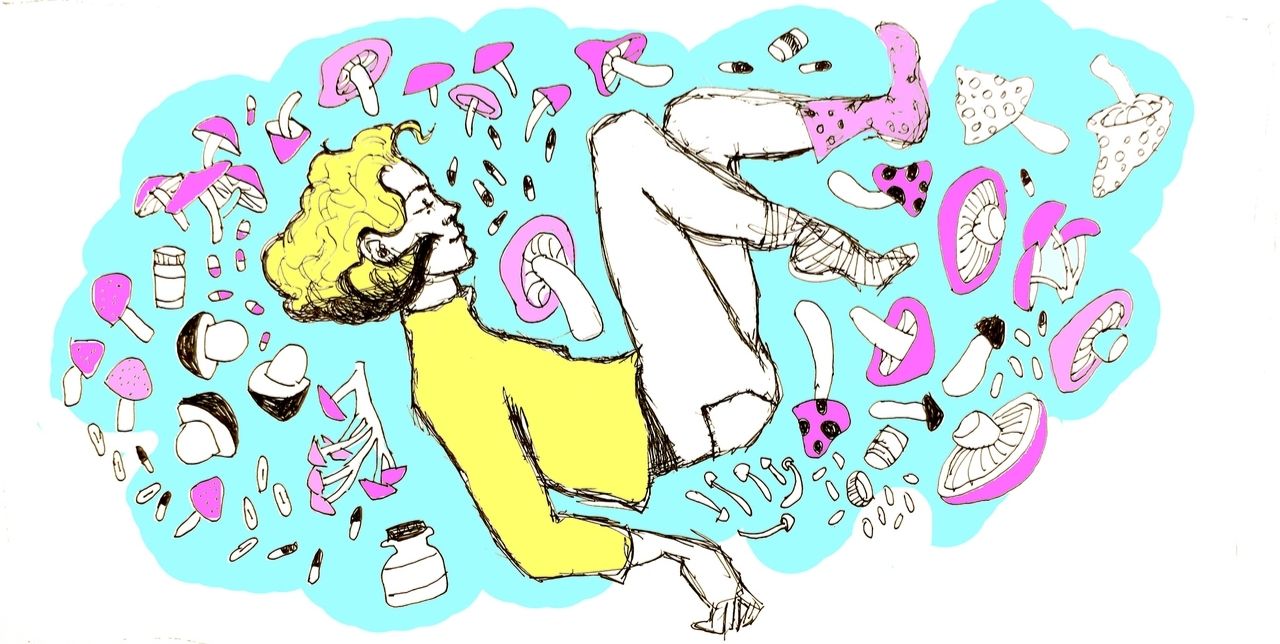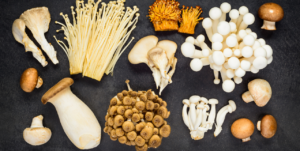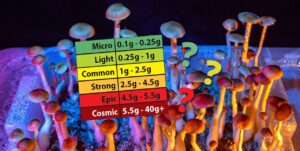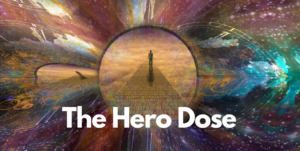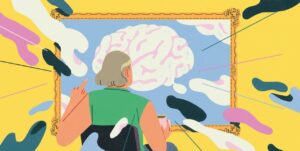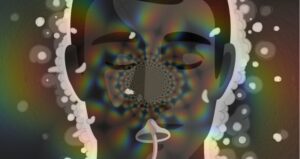Psychedelic mushrooms aren’t just for tripping anymore. Researchers are garnering evidence that medical psilocybin may help deliver a surprising number of benefits; from boosting creativity, to beating addictions and depression.
Though the first thing that pops in people’s minds when you say “psychedelic mushrooms” are probably things like 60s music, Alice in Wonderland, The Yellow Submarine animated film, double complete rainbows, and mind-bending trips, we shouldn’t forget that psilocybin has played a part in shamanism and medicine in societies across the globe for thousands of years.
Now it appears that modern medicine is catching up, and new use cases are being made for psilocybin as a therapeutic aid. In fact, medical research into the medical applications and health benefits of this remarkable natural compound seem to indicate that it may assist in treating a broad number of health issues.
There’s already some promising research on psychedelic mushrooms
Though the FDA has yet to approve psilocybin for anything, there’s mounting evidence out there that it may help treat various addictions like alcohol, tobacco and cocaine, as well as OCD, depression and end-of-life emotional distress.
Among the organizations researching this curious compound is the Heffter Research Institute. Their president, Dr. George R. Greer, explains that
“Our mission is two-fold: one to do research that helps us understand the mind, the brain, how all that works, and number two, to help reduce suffering through therapeutic use of psychedelics.”
The non-profit’s research is now focused on the therapeutic uses of psychedelics, especially psilocybin, for addiction and cancer-related psychiatric disorders. Fortunately, there’s more research out there being done by many other groups, and here are some of the benefits they’ve found so far:
Psychedelic mushrooms increase nerve growth and brain connections
With its ability to promote the growth of new neurons and to connect what are usually disconnected parts of the brain, psilocybin is beginning to establish a reputation for helping promote both neurogenesis and neuroplasticity.
Neurogenesis is important. This ability to grow new neurons and renew brain cells quickly can potentially assist with a number of issues such as healing brain injuries, managing anxiety and depression, as well as improve brain health and cognition overall.
Neuroplasticity is crucial too. It is your brain’s ability to change through growth and reorganization. When psilocybin increases the amount of branches between brain cells, it boosts their neuroplasticity, improving learning and memory retention.
Research on subjects given psilocybin using fMRI showed different areas of the brain in greater synchronicity, allowing the brain to function at a higher level for a limited time.
Research conducted at the University of South Florida demonstrated that psilocybin increased neuroplasticity in the brains of rats, allowing the rodents to overcome fear.
Shrooms boost creativity
Though there isn’t a whole lot of clinical evidence supporting this claim, there is plenty of anecdotal evidence in the form of creative people like artists and musicians using psychedelic mushrooms to expand their consciousness and open their creative minds to new ideas and possibilities.
Data from clinical investigations performed in the 60s indicates that psilocybin’s psychoactive effects caused changes in psychology that approximate the traits of creative people.
In addition, a 2018 study published in the journal Psychopharmacology found that subjects given psychedelic mushrooms were more proficient when it came to coming up with problem-solving ideas. Researchers in this study observed that subjects “were more fluent, flexible and original in the possibilities they came up with.”
Psilocybin can help reduce anxiety
Again, the evidence here is limited, but there are studies out there beginning to demonstrate that psilocybin can be effective for managing anxiety. A study conducted by a team at John Hopkins university found that psilocybin combined with psychological therapy significantly reduced anxiety and depression in terminally ill patients. After 6 hours of treatment, nearly 80% of the group reported feeling less anxiety. Even six months later, 83% of the subjects said their quality of life had improved, and almost two-thirds described the psilocybin sessions as one of the five most important experiences in their lives.
Similarly, a study conducted at NYU Langone Health found that a single dose of psilocybin provided long-term relief of anxiety in cancer patients. Commenting on the study, Dr. Stephen Ross, associate professor of psychiatry in the Department of Psychiatry at NYU Langone Health stated that,
“Our findings strongly suggest that psilocybin therapy is a promising means of improving the emotional, psychological, and spiritual well-being of patients with life-threatening cancer.”
Though the study was limited in scope, especially in light of the small sample size, the findings offer hope that magic mushrooms can actually be a game-changer when it comes to severe anxiety—especially that experienced by those with terminal illnesses.
Shrooms can help promote desired personality changes
There’s a lot of anecdotal evidence backing this claim as well, with stories of shrooms providing a life-changing experience rather commonplace. However, clinical evidence that shrooms can help people change their personalities for the better is starting to come online.
A study in the Journal of Psychopharmacology looking into five primary domains of personality including conscientiousness, agreeableness, openness, extroversion and neuroticism found that psilocybyin produced long term changes in values, attitudes and behaviours, with researchers noting a “significant increases in openness following a high-dose psilocybin session.”
Being “open” in this context refers to a person’s ability to change their attitude towards lived experiences. One’s ability to be open is associated with imagination, aesthetics and creativity. In this study, subjects given psilocybin were more open while experiencing psychoactive effects, with nearly 60% of subjects maintaining a higher level of openness over a year later.
Magic mushrooms can help treat addiction
Here too mushrooms show promise, and are becoming recognized as particularly valuable—especially in light of the fact that psilocybin is not addictive.
Research relating to psilocybin and addiction goes back to the 50s when scientists were investigating psychedelic mushrooms impact on both psychological and neurochemical addiction.
During those studies, researchers found that the introspective mental state which psilocybin initiates had positive impacts on behaviour patterns and sobriety.
Since then numerous other studies have been conducted. In a small pilot study led by Matthew Johnson, PhD, associate professor of psychiatry and behavioural sciences at Johns Hopkins University School of Medicine, researchers conducting a 12-month study found psilocybin was a significant help for subjects trying to abstain from smoking.
“The general idea is that the nature of these disorders is a narrowed mental and behavioural repertoire,” said professor Johnson to Healthline. “So, [psilocybin] in well-orchestrated sessions [has] the ability to essentially shake someone out of their routine to give a glimpse of a larger picture and create a mental plasticity with which people can step outside of those problems.”
Similarly, another small study looking into magic mushrooms effectiveness in treating addiction to alcohol found that both regular drinking and heavy drinking declined following treatment.
In 2018, in Alabama, trials were conducted into psilocybin’s value in helping beat cocaine addiction.
With so much interest being garnered by promising preliminary results, some of the most renowned educational institutions in the world are now conducting studies into psilocybin for treating addiction, including Imperial College London, Johns Hopkins University, Yale, New York University, and University of California-San Francisco.
Thanks to it being completely safe when used in a clinical environment and its extremely low toxicity, psilocybin is proving uniquely attractive compared to current pharmacological solutions.
Psychedelic Mushrooms can decrease the intensity of OCD symptoms
In one clinical trial where individuals diagnosed with OCD were given four varying doses of psilocybin every four weeks, researchers found that the dose of psilocybin hardly mattered. Whether it was the smallest dose administered or the largest, each of the four various dose sizes still resulted in relief from unwanted repetitive ideation as well as compulsive behaviours.
In another study conducted by the University of Arizona, psilocybin again demonstrated it was effective in treating symptoms of OCD.
According to researchers in the study, psilocybin was able to achieve these effects through its interactions with various serotonin receptors. By binding to serotonin receptors, psilocybin was able to modulate receptor activity, resulting in a notable decrease in OCD symptoms.
 Shrooms may have applications for PTSD
Shrooms may have applications for PTSD
Though preliminary research into this application are encouraging, it must be noted that research into magic mushrooms for PTSD has been limited to studies using animal models.
In a clinical trial conducted on mice, subjects were conditioned to produce a pain response by using electroshocks timed with sound signals. Once conditioned, the mice began to show symptoms of pain from the sound signals alone, without the shocks.
After being given psychedelic mushrooms, the mice began to be able to break the conditioned pain response, while also exhibiting increased neurogenesis. Neurogenesis is considered important here because it causes the growth of new brain cells, as well as the repair of damaged cells, in the hippocampus—a region of the brain involved with regulating emotions, memory and mood.
These studies show, once again, that psychedelic mushrooms promote neurogenesis, and indicate they may hold potential for assisting those suffering from PTSD as well as degenerative brain diseases like Parkinson’s, dementia or Alzheimer’s.
They can help with long-term depression
Depression can affect us all. In Canada, the incidence of depression is high, despite Canadians living in one of the safest, happiest countries in the world. In fact, OECD statistics show that a full 9% of Canadians are on some sort of anti-depressant medication.
Fortunately, there is an ever-growing body of evidence showing that shrooms may be a powerful tool for dealing with depression.
In a 2017 study conducted at the Imperial College London, researchers found that psilocybin “may effectively reset the activity of key brain circuits known to play a role in depression.”
The Head of Psychedelic Research at Imperial, Dr. Robin Carhart-Harris, led the study, and noted that:
“Several of our patients described feeling ‘reset’ after the treatment and often used computer analogies. For example, one said he felt like his brain had been ‘defragged’ like a computer hard drive, and another said he felt ‘rebooted’.
“Psilocybin may be giving these individuals the temporary ‘kick start’ they need to break out of their depressive states and these imaging results do tentatively support a ‘reset’ analogy. Similar brain effects to these have been seen with electroconvulsive therapy.”
In a first-of-its kind study of untreatable long-term depression, 12 volunteers given a range of doses were found to have decreased the depressive symptoms dramatically even three months after dosing.
In another study conducted on shrooms for treatment-resistant depression, all 15 subjects reported improved mood balance and feeling less pessimistic within a week of the trial’s conclusion.
Thanks to a growing number of positive results, the FDA has granted psilocybin “breakthrough therapy” status for depression, meaning it is being fast-tracked for approval.
They may help fight Alzheimer’s
Though evidence is quite limited in the case of Alzheimer’s, the fact that psychadelic mushrooms can promote neurogenesis and neuroplasticity means that shrooms at least hold promise.
In a study published online in the Journal of Alzheimer’s Disease, researchers at the Psychological Medicine and Biochemistry at the NUS Yong Loo Lin School of Medicine in Singapore looking into psilocybin as a treatment for Mild Cognitive Impairment (MCI) found that seniors taking shrooms had reduced their odds of being afflicted by MCI by around 50%.
While direct evidence of shrooms efficaciousness for treating Alzheimer’s has yet to arrive, more research is coming soon. According to
Roland Griffiths, Ph.D., Director, Center for Psychedelic and Consciousness Research at Johns Hopkins Medicine,
“Studies of psilocybin in patients will determine its effectiveness as a new therapy for opioid addiction, Alzheimer’s disease, post-traumatic stress disorder (PTSD), post-treatment Lyme disease syndrome (formerly known as chronic Lyme disease), anorexia nervosa and alcohol use in people with major depression. The researchers hope to create precision medicine treatments tailored to individual patients’ specific needs.”
Psilocybin can help with psychological distress arising from terminal illness
One of the most significant and promising applications for psilocybin is in dealing with diagnoses of terminal illness and the negative psychological and emotional impacts such diagnoses cause.
Anxiety that arises with being diagnosed with a terminal illness can have strong negative impacts, creating the potential for more psychological conditions to develop, as well as reducing the effectiveness of clinical treatment.
Fortunately, it seems psychadelic mushrooms may potentially help deliver better clinical outcomes by assisting individuals regain a sense of meaning, improve their mood and help them alter their perspective, granting the ability to convert hopelessness and despair into positive insights relating to themselves and their world.
In one trial involving 51 patients experiencing depression associated to their cancer diagnoses, participants were given doses of between 20-30mg psilocybin, with dramatic results. Not only did participants express reduced fears of death, their depression and anxiety were also significantly reduced. The psychological changes induced by the doses of psychedelic shrooms were sustained over 6 months.
In an interview with Healthline, Dr. Charles Grob, professor of psychiatry at the UCLA David Geffen School of Medicine, agreed that psilocybin shows promise,
“There’ve been some promising preliminary results in such areas such as the treatment of overwhelming existential anxiety in people who are facing the end of life, who have diagnoses of advanced-stage cancer.”
One such trial whose results support that notion was a 2016 study at Johns Hopkins, which found that a single dose of magic mushrooms reduced the anxiety and depression of subjects diagnosed with cancer, significantly improving their quality of life.
“The thing that we have the most evidence for is cancer-related depression and anxiety. That seems really strong, and I’d be surprised if those results didn’t hold up,” said Matthew Johnson, PhD, associate professor of psychiatry and behavioural sciences at Johns Hopkins University School of Medicine, who was a researcher on the study.
Psychedelic mushrooms are amazing, with so many benefits to enjoy!
This short list of 10 benefits is by no means complete, but is it any surprise mushrooms can have so many positive impacts? Psilocybe mushrooms are complex organisms from the kingdom of fungi, which has been present on earth for at least 2,400 million years, according to the fossil record—long enough to learn more than a bag of tricks.
In his article 7 Mind-Bending Facts About Magic Mushrooms, Russell McLendon writes that:
“They’ve evolved some impressive tricks during that time, including many that are either fascinating or frightening to humans — and sometimes a bit of both. Some ancient fungi grew nearly 30 feet tall before trees existed, for example, and today a 400-acre fungus in Oregon may be the largest organism on the planet. Certain fungi can glow in the dark, and a few turn insects into zombies. Some species are lethal to humans, while others provide us with valuable super foods…Yet even after centuries of experience, we are only now demystifying many of the magical — and medicinal — powers these mushrooms possess.”
Becoming a Mycologist: 5 things you should know in advance
Dreaming of exploring the forest floor, cataloging exotic fungi, knowing more about your favorite strains of psilocybin shrooms and maybe discovering a new species of […]
Read MoreThis Mushroom Dosage Chart Can Help You Create Your Ideal Experience
So you’ve decided to take the plunge and try mushrooms for the first time—Congratulations! But, are you sure you know how much you want to […]
Read MoreMushroom Trip Aftermath: Tips for a Smooth Recovery
Experiencing a magic mushroom trip can be enlightening and transformative, but the aftermath often brings a mix of physical and emotional effects. Whether you’re dealing […]
Read MoreThe Hero Dose
As a frequent user of psilocybin mushrooms, I’m always looking for ways to enhance my experience and deepen my understanding of myself and the world […]
Read More5 Crazy Cool Benefits of Psilocybe Semilanceata AKA Liberty Caps
Psilocybe semilanceata. Known as “liberty caps” in North America, they are referred to simply as “the magic mushroom” across the pond in the UK. But […]
Read MoreFirst Shroom Trip? Some Do’s and Don’ts to Enjoy the Best Trip!
Are you considering a shroom, but unsure how to go about it? Could shrooms be dangerous? How can you have the best trip possible? Are […]
Read MoreMedical disclaimer: This page is for educational and informational purposes only and may not be construed as medical advice. The information is not intended to replace medical advice offered by physicians.
